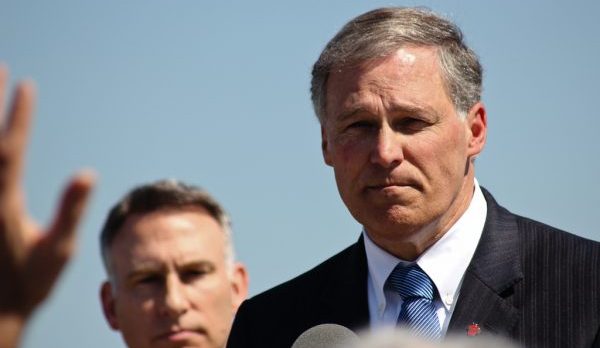
Reaction to Inslee’s tax proposal in the Seattle Times has been largely negative, and the mileage tax idea is also getting a cold reception. Inslee described his tax proposal as “a big, bold thing, but Washington is a big, bold state.”
He alluded to building the Grand Coulee Dam and the Boeing 747, neither of which were done by state government. The dam was built by the federal government. The airplane was developed by the Boeing company. KVI commentators John Carlson and Kirby Wilbur ridiculed Inslee’s attempt to compare those projects to a massive tax increase.
Inslee’s plan will face tough scrutiny in Olympia, and there are already hints that fiscally conservative Democrats have problems with the proposal.
The mileage tax was immediately ripped by KIRO Radio’s Dori Monson during Tuesday’s noon hour broadcast, and Tacoma News Tribune readers were not happy. Social media is also heating up.
According to the News Tribune story:
“The pilot program will include 2,000 drivers from across the state. The yearlong test will explore ways that the state could charge drivers for road usage, which the state is looking at as a potential alternative to the gas tax it now imposes to pay for road projects.
“Right now, drivers in Washington pay a 49.4-cent state tax on each gallon of gasoline they buy, which helps fund road projects and highway maintenance throughout the state.
“But state officials warn that over time, gas tax revenues won’t keep up with the cost of highway projects and maintaining the state’s roads and freeways — mainly, because vehicles are becoming more fuel efficient.
“By 2035, the state Transportation Commission predicts gas tax revenues will decline by 45 percent per mile driven, as the average vehicle’s fuel efficiency is projected to climb from 20.5 miles per gallon to 35 miles per gallon.”
So, say critics, because government encouraged people to buy more fuel efficient vehicles, fuel tax revenue is declining and now bureaucrats in Olympia have to create a new way to stay in the driving public’s wallet.
At least one critic of pay-per-mile has observed, “Once they can control your movement, they’ve got you.” If this idea takes hold, expect other states to begin adopting it. Oregon has already been testing the idea, the News Tribune reported, so neighboring Washington is simply picking up the ball and running with it.
An earlier story in the News Tribune noted that gas tax revenues that had been climbing have now hit a plateau and “are expected to head downward.” This, from a state that charges 49.4 cents a gallon tax, the second highest in the nation, according to a Tax Foundation report earlier this year. Pennsylvania was slightly ahead at the time.
This pilot program will reportedly involve 2,000 drivers around the state and will last for one year. According to the newspaper, the tax-per-mile would be 1.9 cents, which will translate to $9.50 for every 500 miles someone drives. This could impact people in rural areas who may have to commute long distances to work, school or other destinations. It will affect outdoorsmen and women including hikers, hunters, anglers and campers.
Likewise, Inslee’s proposal includes a capital gains tax, which amounts to an income tax on a select group of individuals.
The governor’s tax plan is aimed at solving the teacher salary component of the McCleary decision by the Washington State Supreme Court in 2012. But by trying to solve that problem, Inslee may have just created a much larger political problem for his party.